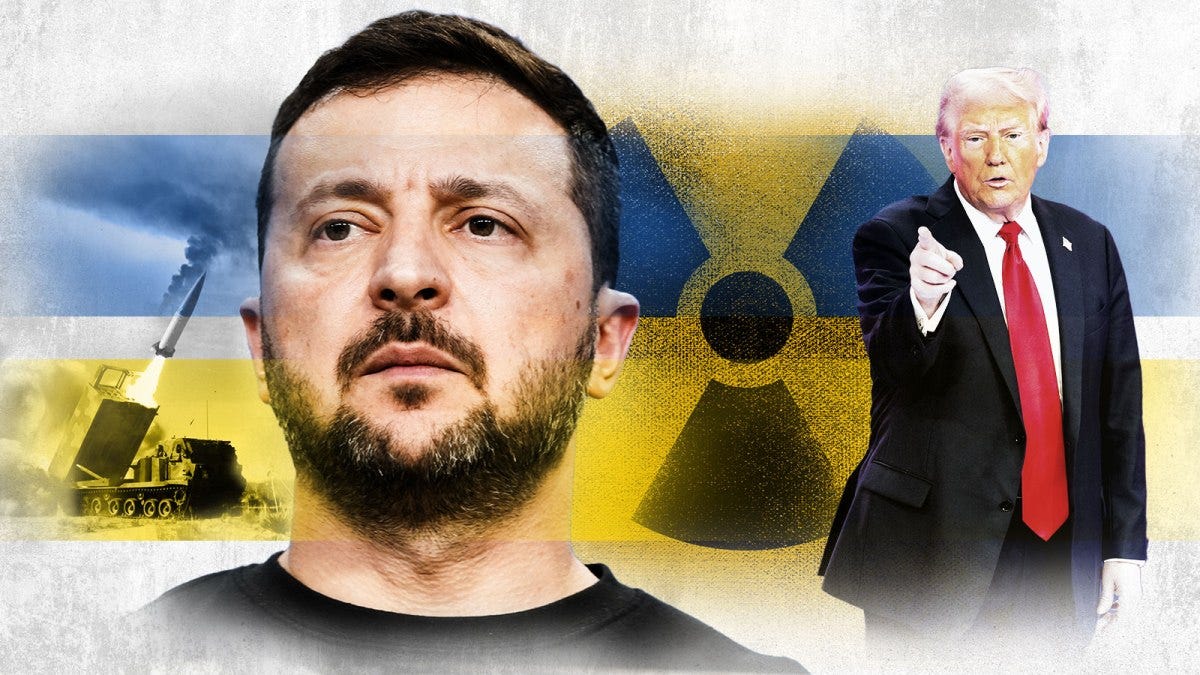The widespread belief that Ukraine voluntarily surrendered a vast nuclear arsenal in exchange for ironclad security guarantees is a mischaracterization that has gained undue traction in public discourse. The reality is both simpler and more revealing: Ukraine never had operational control over any nuclear weapons at any point. The warheads and delivery systems stationed on Ukrainian soil at the time of independence were always under Moscow’s control, and Ukraine’s path toward nuclear disarmament was set before it ever became a sovereign state. The recent claims by President Volodymyr Zelensky—insisting that Ukraine gave up nuclear weapons in return for security guarantees—misrepresent history. Understanding this history correctly is crucial, especially in light of contemporary debates over NATO expansion, military aid, and Zelensky’s provocative demands for Ukraine’s own nuclear arsenal.
At the moment of its independence from the Soviet Union in 1991, Ukraine found itself hosting the third-largest nuclear arsenal in the world, consisting of intercontinental ballistic missiles (ICBMs), strategic bombers, and tactical nuclear warheads. However, this arsenal was effectively meaningless in a functional sense. The keys to detonation and launch codes remained in Moscow. The weapons could not be used, directed, or even maintained by Ukraine without Russian assistance. More importantly, well before Ukraine formally declared independence, it had already made a firm and public commitment never to seek or develop nuclear weapons. This commitment was enshrined in Ukraine’s 1990 Declaration of Sovereignty, which explicitly pledged that Ukraine would be a non-nuclear state. Without this commitment, many nations—including the United States—would have been reluctant to recognize Ukraine’s sovereignty or integrate it into the international system.
Ukraine’s non-nuclear stance was not only a matter of political expediency but also a practical reality. The Soviet military’s highly centralized control of nuclear weapons meant that launch codes, command structures, and technical expertise were beyond Ukraine’s reach. While some Ukrainian officials and military officers debated whether the country should assert control over the nuclear assets left on its soil, the reality was that Ukraine lacked the ability to use or maintain them. The warheads required extensive servicing, which could only be performed in Russian facilities. The ICBMs themselves were integrated into a launch system that remained under Moscow’s command. Any attempt to bypass Russian control would have required an immense technological and logistical effort—one that Ukraine neither had the capability nor the political will to undertake.
The oft-cited Budapest Memorandum of 1994 is frequently mischaracterized as a security guarantee in exchange for Ukraine’s nuclear weapons. In truth, the agreement merely affirmed the existing borders and sovereignty of Ukraine—commitments that Russia, the United States, and the United Kingdom had already recognized. The notion that Ukraine was promised military intervention in the event of aggression is a distortion of what the document actually says. The Budapest Memorandum included assurances of respect for Ukraine’s sovereignty but lacked any binding enforcement mechanism. The idea that the U.S. or NATO was ever legally bound to intervene militarily in Ukraine’s defense is a convenient myth that has since been exploited for political purposes.
Furthermore, Ukraine’s nuclear disarmament was not an act of naive altruism; it was a pragmatic decision driven by necessity and financial incentives. The United States and Russia, recognizing that Ukraine had neither the ability nor the resources to maintain the nuclear arsenal, brokered a deal that provided Ukraine with financial compensation and security assurances in exchange for transferring the warheads to Russia. Ukraine received approximately $1.2 billion (adjusted for inflation) from the United States as part of the arrangement, along with assistance in dismantling missile silos and transitioning away from nuclear infrastructure. This was not a coercive deal but rather an arrangement that allowed Ukraine to comply with its own stated policy while benefiting materially.
In light of this history, Zelensky’s recent rhetoric about nuclear weapons is particularly striking. His suggestion that Ukraine might forego NATO membership in exchange for acquiring its own nuclear deterrent is not only unrealistic but fundamentally misleading. His claim that Ukraine “gave up” nuclear weapons in exchange for security guarantees, which have since been violated, rests on a false premise. Ukraine never had the capacity to wield nuclear weapons, and its disarmament was not a betrayal by the West but a necessary step dictated by the geopolitical realities of the early 1990s. Moreover, the United States and its allies have provided Ukraine with massive military assistance during its war with Russia—assistance that far exceeds any obligations outlined in the Budapest Memorandum. NATO has not abandoned Ukraine; on the contrary, it has invested heavily in Ukraine’s defense despite having no formal treaty obligation to do so.
The idea that Ukraine was wronged by giving up nuclear weapons is a revisionist narrative that ignores the facts. The nuclear weapons in Ukraine in 1991 were never truly “Ukrainian.” They were remnants of a collapsed empire, maintained by another country, and completely out of Ukraine’s control. The so-called “security guarantees” in the Budapest Memorandum were never military commitments, and the realpolitik of the 1990s made it impossible for Ukraine to retain nuclear weapons even if it had wanted to. Zelensky’s recent nuclear demands are not only unrealistic but fundamentally at odds with the history of Ukraine’s nuclear disarmament. Ukraine did not “give up” its nuclear weapons—it never had them to begin with.
If you don't already please follow @amuse on 𝕏 and subscribe to the Deep Dive podcast.






I think we can without a shadow of a doubt that the world is filled with so many lies and liars that we can never really know if something is true.